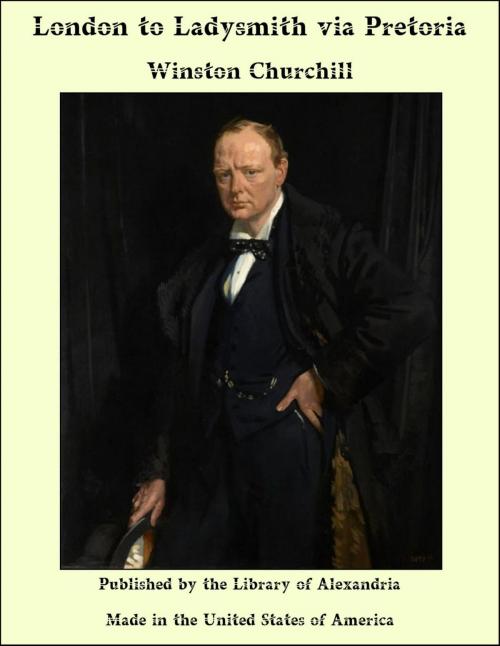London to Ladysmith via Pretoria
Nonfiction, Religion & Spirituality, New Age, History, Fiction & Literature| Author: | Winston Churchill | ISBN: | 9781465581174 |
| Publisher: | Library of Alexandria | Publication: | March 8, 2015 |
| Imprint: | Language: | English |
| Author: | Winston Churchill |
| ISBN: | 9781465581174 |
| Publisher: | Library of Alexandria |
| Publication: | March 8, 2015 |
| Imprint: | |
| Language: | English |
R.M.S. 'Dunottar Castle,' at sea: October 26, 1899. The last cry of 'Any more for the shore?' had sounded, the last good-bye had been said, the latest pressman or photographer had scrambled ashore, and all Southampton was cheering wildly along a mile of pier and promontory when at 6 P.M., on October 14, the Royal Mail steamer 'Dunottar Castle' left her moorings and sailed with Sir Redvers Buller for the Cape. For a space the decks remained crowded with the passengers who, while the sound of many voices echoed in their ears, looked back towards the shores swiftly fading in the distance and the twilight, and wondered whether, and if so when, they would come safe home again; then everyone hurried to his cabin, arranged his luggage, and resigned himself to the voyage. What an odious affair is a modern sea journey! In ancient times there were greater discomforts and perils; but they were recognised. A man took ship prepared for the worst. Nowadays he expects the best as a matter of course, and is, therefore, disappointed. Besides, how slowly we travel! In the sixteenth century nobody minded taking five months to get anywhere. But a fortnight is a large slice out of the nineteenth century; and the child of civilisation, long petted by Science, impatiently complains to his indulgent guardian of all delay in travel, and petulantly calls on her to complete her task and finally eliminate the factor of distance from human calculations. A fortnight is a long time in modern life. It is also a long time in modern war—especially at the beginning. To be without news for a fortnight at any time is annoying. To be without news for a fortnight now is a torture. And this voyage lasts more than a fortnight! At the very outset of our enterprise we are compelled to practise Mr. Morley's policy of patience. We left London amid rumours of all kinds. The Metropolis was shrouded in a fog of credulous uncertainty, broken only by the sinister gleam of the placarded lie or the croak of the newsman. Terrible disasters had occurred and had been contradicted; great battles were raging—unconfirmed; and beneath all this froth the tide of war was really flowing, and no man could shut his eyes to grave possibilities. Then the ship sailed, and all was silence—a heaving silence. But Madeira was scarcely four days' journey. There we should find the answers to many questions. At Madeira, however, we learned nothing, but nothing, though satisfactory, is very hard to understand. Why did they declare war if they had nothing up their sleeves? Why are they wasting time now? Such were the questions. Then we sailed again, and again silence shut down, this time, however, on a more even keel.
R.M.S. 'Dunottar Castle,' at sea: October 26, 1899. The last cry of 'Any more for the shore?' had sounded, the last good-bye had been said, the latest pressman or photographer had scrambled ashore, and all Southampton was cheering wildly along a mile of pier and promontory when at 6 P.M., on October 14, the Royal Mail steamer 'Dunottar Castle' left her moorings and sailed with Sir Redvers Buller for the Cape. For a space the decks remained crowded with the passengers who, while the sound of many voices echoed in their ears, looked back towards the shores swiftly fading in the distance and the twilight, and wondered whether, and if so when, they would come safe home again; then everyone hurried to his cabin, arranged his luggage, and resigned himself to the voyage. What an odious affair is a modern sea journey! In ancient times there were greater discomforts and perils; but they were recognised. A man took ship prepared for the worst. Nowadays he expects the best as a matter of course, and is, therefore, disappointed. Besides, how slowly we travel! In the sixteenth century nobody minded taking five months to get anywhere. But a fortnight is a large slice out of the nineteenth century; and the child of civilisation, long petted by Science, impatiently complains to his indulgent guardian of all delay in travel, and petulantly calls on her to complete her task and finally eliminate the factor of distance from human calculations. A fortnight is a long time in modern life. It is also a long time in modern war—especially at the beginning. To be without news for a fortnight at any time is annoying. To be without news for a fortnight now is a torture. And this voyage lasts more than a fortnight! At the very outset of our enterprise we are compelled to practise Mr. Morley's policy of patience. We left London amid rumours of all kinds. The Metropolis was shrouded in a fog of credulous uncertainty, broken only by the sinister gleam of the placarded lie or the croak of the newsman. Terrible disasters had occurred and had been contradicted; great battles were raging—unconfirmed; and beneath all this froth the tide of war was really flowing, and no man could shut his eyes to grave possibilities. Then the ship sailed, and all was silence—a heaving silence. But Madeira was scarcely four days' journey. There we should find the answers to many questions. At Madeira, however, we learned nothing, but nothing, though satisfactory, is very hard to understand. Why did they declare war if they had nothing up their sleeves? Why are they wasting time now? Such were the questions. Then we sailed again, and again silence shut down, this time, however, on a more even keel.















